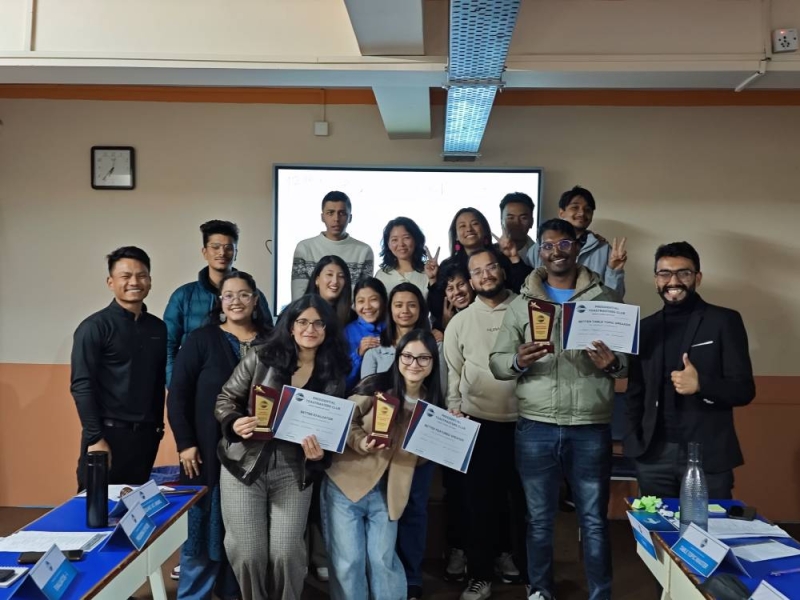In today's rapidly evolving global economy, Nepal's higher education system is struggling to keep pace. Graduates leave university armed with degrees but lacking the critical skills employers demand-communication, leadership, digital fluency, and problem-solving. The result? A growing divide between academic credentials and real-world employability.
With outdated curricula, minimal industry exposure, and limited language proficiency-especially in English-many young professionals are finding themselves lost in transition, jobless or underemployed. This widening gap calls for a fresh, dynamic solution. One such global movement making quiet but powerful waves in Nepal is Toastmasters.

Toastmasters International is more than just a public speaking club-it's a global movement that transforms individuals into confident communicators and empowered leaders. Founded nearly a century ago, this nonprofit educational organization operates through a worldwide network of clubs that follow a proven, structured format. In every meeting, members step up to deliver prepared speeches, think on their feet with impromptu responses (known as Table Topics), and sharpen their skills through constructive peer evaluations.
Beyond speaking, members take on leadership roles, both within and beyond meetings, allowing them to grow in confidence, collaboration, and personal impact. Post academic courses young, and often-inexperienced learners are introduced to corporate scenarios. There they often face presentations, interviews, and group discussions situations for employment.
Toastmasters has different pathways programs that provide step by step guide to confidently face and succeed in such scenarios. Toastmasters members practice facing interviews, make effective presentations, moderating group discussions, etc. in a safe space to practice and grow.
Current-day academic scenarios are changing. Besides written examinations students face project-based evaluations that include presentations, group projects and class discussions as part of their academic course plan. Joining Toastmasters allows learner to practice these activities and replicate them in real-life, classroom settings.
In Toastmasters students learn how to communicate ideas clearly, stay calm under pressure, and engage an audience. Toastmasters develops leadership potential in club members through a uniquely crafted system that operates globally. A variety of leadership roles in the club, area, division, region and international levels ensure exposure to real-world corporate structures.
At the club level there are different roles (e.g., President, Vice Presidents, Treasurer, Secretary and Sergeant at Arms).
Every club houses an executive committee that oversee club operations. These help members practice different aspects of leadership like planning, execution, control, collaboration, responsibility, accountability, goal-driven projects, etc. Every club meeting has defined roles - e.
g., Toastmaster of the Day, Evaluator, Grammarian, Ah Counter, Timer and Vote Counter – these help students take on leadership in low-risk, high-reward ways. It is said 'feedback is the breakfast of champions'.
However, giving and receiving feedback is a crucial skill often not taught and practiced in academic settings. Toastmasters meetings help students grow feedback giving-and-receiving through structured mechanisms that are practiced in all club meetings. All Toastmasters members receive constructive, immediate feedback on speeches, which is rare in academic settings.
In today's interconnected world, one's net worth is determined by his/her network'. Being a member of the Toastmasters community exposes learners to a wide community consisting of Corporates, Community-based and Institutional professionals that have diverse range of experiences and expertise. This interconnected community work with each other in becoming better communicators and leaders, through club meetings and various contests and conferences.
Such expansive network and events help learners to grow and develop beyond their classroom experiences. The corporate world requires skilled human resources beyond academic degrees. Toastmasters are trained to demonstrate initiative, communication skills, and leadership-qualities that the employers prefer.
Toastmasters also helps with interviewing, networking, and making a strong impression. The Toastmasters Pathways program teaches soft skills to its members like: emotional intelligence, persuasion, negotiation, leadership, and more, which are important skills in the jobs. Globalization has affected the education sector as well.
Learners do not want to limit themselves to Nepal. More and more graduates are going abroad for the further studies. Toastmasters exists in 143 countries/ territories.
Students as Toastmasters will become a part of this global community of positive, growth-minded individuals and community with right minded people. Observing these gaps that can be turned into growth opportunities, most of the top B-Schools in Nepal have already established Toastmasters clubs. The Toastmasters community is growing and industry can now expect to get better communicators and leaders as human resource that will drive industrial and institutional growth.
Ace Toastmasters Club Apex Toastmasters Club DAV Toastmasters Club ICA Toastmasters Club IIMS Toastmasters Club KCM Toastmasters Club KUSOM Toastmasters Club Leadbox Toastmasters Club (Initiated and Managed by Himalayan Whitehouse College) Presidential Toastmasters Club SAIM Toastmasters Club United College Toastmasters Club If you want to be a part of this growing network of educational institutions and form a Toastmasters club in your college/campus, get in touch with the Club Growth Leadership team from Nepal, Toastmaster Chandrayan P. Shrestha at [email protected].
.
Entertainment

Toastmasters bridging the gap

KATHMANDU, APRIL 24In today's rapidly evolving global economy, Nepal's higher education system is struggling to keep pace. Graduates leave university armed with degrees b...















